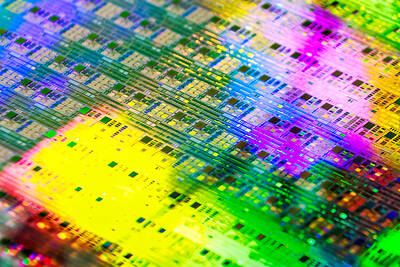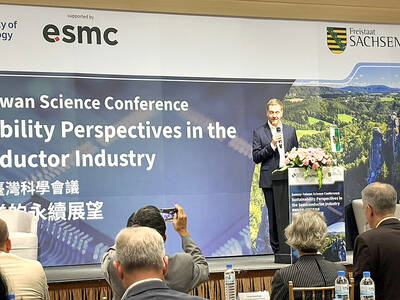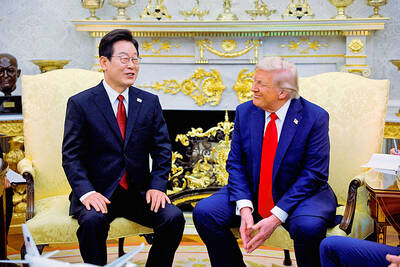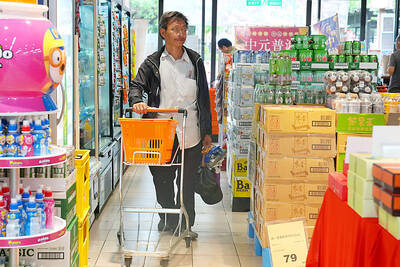
MANUFACTURING: The US Department of Commerce would impose a tariff equal to a percentage of the estimated value of the product’s chip content, sources said US President Donald Trump’s administration is considering imposing tariffs on foreign electronic devices based on the number of chips in each one, as it seeks to drive companies to shift manufacturing to the US, three people familiar with the matter said. According to the plan, which has not previously been reported and could change, the US Department of Commerce would impose a tariff equal to a percentage of the estimated value of the product’s chip content. The US commerce department did not immediately respond to requests for comment. Asked about the details, White House spokesman Kush Desai said, “America cannot

Conferences are meant to bring young people from different countries together to tackle the defining challenges of the century, Saxony Minister-President Michael Kretschmer said yesterday in Taipei, adding that Taiwan and Saxony share similar histories of nurturing talent and engineers. Kretschmer was speaking at the first-ever Saxony-Taiwan Science Conference, a forum aimed at deepening cooperation in the semiconductor and electronics sectors. At the opening ceremony, Kretschmer said the one-day event was a continuation of a series of similar conferences held in Dresden, the capital of the German state of Saxony, where Taiwan Semiconductor Manufacturing Co (TSMC, 台積電) is building a wafer

CURRENCY SWAP: ‘ It is objectively and realistically not a level we are able to handle,’ an official said, with Seoul seeking a loan and FX deal to finance the investment South Korea cannot provide the US with US$350 billion in cash as suggested by Washington under a deal to lower tariffs, a senior official said. “Our position is not a negotiating tactic,” South Korean National Security Adviser Wi Sung-lac said in a Channel A News television interview on Saturday evening. “It is objectively and realistically not a level we are able to handle,” he added. “We are not able to pay US$350 billion in cash.” Seoul and Washington agreed in July to a US$350 billion investment pledge as part of a broader trade deal to lower US tariffs to 15

STOCK GAINS: The headline consumer confidence index rose 1.38 points from August, driven almost entirely by a surge in the stock investment subindex Taiwan’s consumer confidence index (CCI) climbed to a four-month high of 64.69 last month, buoyed by stock market gains fueled by artificial intelligence (AI) demand, even as sentiment toward jobs, household finances and housing weakened, National Central University (NCU) said yesterday. The headline index rose 1.38 points from August, driven almost entirely by a surge in the stock investment subindex, which jumped 20.48 points to 51.68 — the steepest monthly gain among the six CCI components. The other five subindexes all declined. “The AI boom has sparked strong demand for Taiwan’s electronics and pushed the local bourse to record highs,” NCU Research